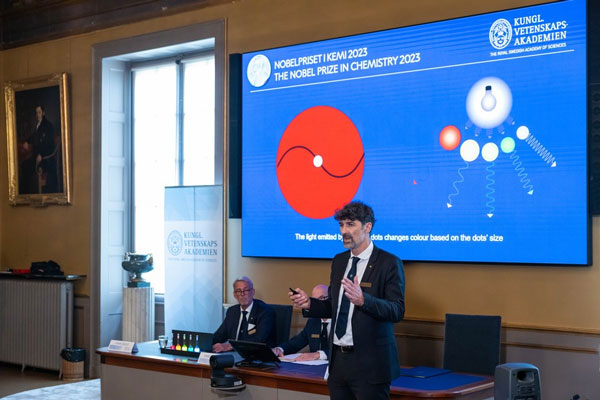
This year’s laureates “have succeeded in producing particles so small that their properties are determined by quantum phenomena. The particles, which are called quantum dots, are now of great importance in nanotechnology,” said the Royal Swedish Academy of Sciences.
Stockholm, Sweden | Xinhua | Three scientists, Moungi G. Bawendi, Louis E. Brus and Alexei I. Ekimov, won the 2023 Nobel Prize in Chemistry, “for the discovery and synthesis of quantum dots,” the Royal Swedish Academy of Sciences announced Wednesday.
The Nobel Prize in Chemistry 2023 rewards the discovery and development of quantum dots, nanoparticles so tiny that their size determines their properties, the academy said in a statement.
“These smallest components of nanotechnology now spread their light from televisions and LED lamps, and can also guide surgeons when they remove tumour tissue, among many other things,” it added.
This year’s laureates “have succeeded in producing particles so small that their properties are determined by quantum phenomena. The particles, which are called quantum dots, are now of great importance in nanotechnology,” said the statement.
“Quantum dots have many fascinating and unusual properties. Importantly, they have different colours depending on their size,” said Johan Aqvist, chair of the Nobel Committee for Chemistry.
In the early 1980s, Ekimov succeeded in creating size-dependent quantum effects in coloured glass. The colour came from nanoparticles of copper chloride and Ekimov demonstrated that the particle size affected the colour of the glass via quantum effects, said the statement.
A few years later, Brus was the first scientist in the world to prove size-dependent quantum effects in particles floating freely in a fluid.
In 1993, Bawendi revolutionized the chemical production of quantum dots, resulting in almost perfect particles. This high quality was necessary for them to be utilized in applications.
Quantum dots now illuminate computer monitors and television screens based on QLED technology. They also add nuance to the light of some LED lamps, and biochemists and doctors use them to map biological tissue.
Researchers believe that in the future they could contribute to flexible electronics, tiny sensors, thinner solar cells and encrypted quantum communication, said the statement.
“(I am) very surprised, unexpected, and very honored,” Bawendi said in the onsite telephone interview of his reactions.
Bawendi, born 1961 in Paris, France, got his PhD in 1988 from University of Chicago in the United States. He is now professor at Massachusetts Institute of Technology (MIT).
Brus, born 1943 in Cleveland, the United States, got his PhD in 1969 from Columbia University. He is now professor at Columbia University.
Ekimov, born 1945 in the USSR, got his PhD in 1974 from Ioffe Physical-Technical Institute, Russia. He was the chief scientist at Nanocrystals Technology Inc., the United States.
The prize amount is 11 million Swedish kronor (about 1 million U.S. dollars) and will be shared equally between the three laureates. (1 Swedish krona = 0.091 U.S. dollar) ■
 The Independent Uganda: You get the Truth we Pay the Price
The Independent Uganda: You get the Truth we Pay the Price


